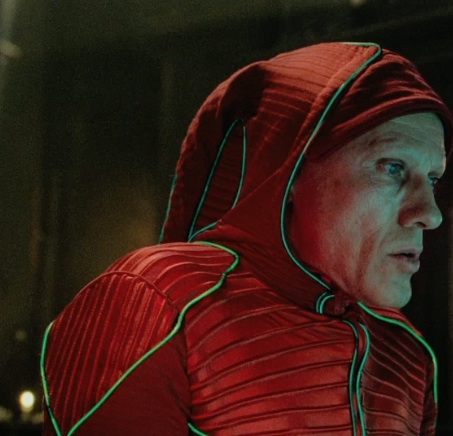TMI
 From an interview with Terry Gilliam at Slate, about his new movie, which sounds more like something Aronofsky would have made: “His new movie, “The Zero Theorem,” starring Christoph Waltz as an isolated computer programmer searching for the meaning of life in an overloaded info-society not far removed from our own, has been in the works for at least six years.”
From an interview with Terry Gilliam at Slate, about his new movie, which sounds more like something Aronofsky would have made: “His new movie, “The Zero Theorem,” starring Christoph Waltz as an isolated computer programmer searching for the meaning of life in an overloaded info-society not far removed from our own, has been in the works for at least six years.”
Going back to the character that Christoph plays in this film, there’s so much going on on the surface, but what really got to me was the tremendous sadness. This person who has a creative drive, a creative urge, and is in a situation where there’s no way for him to fulfill that. That struck me as a situation of extreme pathos.
Well that’s how I see the film. It’s very funny but it’s basically tragedy. It’s very sad. It does move me. You can sort of do the parallels between me and that guy, but at heart that’s not really what it is. Not getting to do what you want to do is one thing, but his problem is that he lets life and relationships fall apart because he can’t grasp them. He’s so damaged — I think the scene when Bainsley [a femme fatale played by French actress Mélanie Thierry] leaves and offers for him to come along, he can’t do it. For me that’s the core scene of the film. What happened to this guy? So in the end, I had to leave him with some kind of sense of dignity and a kind of peace. It may only exist in a virtual world and at least he can let the sun set. He can control that much. I mean, when I make a film, there’s always a big autobiographical element in it, that’s the only way I know how to make films. I have to identify with the character in one way or another. And this one, in retrospect, ended up being quite interesting because when I started it I didn’t think it was going to be that film exactly, but that’s what it became.
Your portrayal of the world is so interesting, people will inevitably look back to your earlier films and other people’s. I felt like you were referencing “Blade Runner,” which came out just before “Brazil,” more directly than you ever have before. But the important thing to me was that this portrait of the informational clutter of the world is almost not a satire or an exaggeration. It’s maybe a tiny bit exaggerated, but it’s almost a portrait of the real world.
Yes. Thank you for that. People talk about it in some sort of future, dystopic view. No! It’s exactly what’s going on right now as far as I’m concerned. [Laughs.] When I walk out onto the streets of London, I’m bombarded exactly like Qohen is at the beginning of the film. It’s endless, it seems to me. And that’s why I sort of built that world around him. Everything in the world out there is colorful and people seem to be having a good time and shopping is bubbling away and things are being offered to you left, right and center. The workplace is a colorful place with people zipping around having a great time. There’s only one bit of darkness and grayness in the thing and that’s Qohen. And that’s what intrigued me about him. He’s very much like a monk. He’s in a burned-out church and it’s a church that has no meaning anymore. That particular construct of life has passed him by. And yet, that’s why I love when another character tells him, “Nonetheless, you’re a man of faith. And that is the very thing that has made you not live your life.”
Comments are currently closed.